Recent Articles
Popular Makes
Body Types
2019 GMC Canyon Denali Road Test and Review
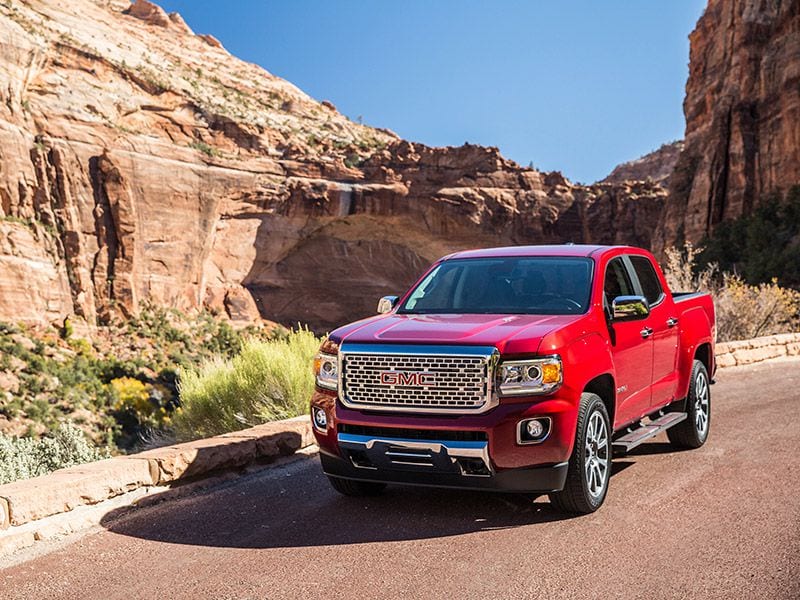
2019 GMC Canyon Denali hero ・ Photo by General Motors
The market for mid-size pickups grew by 18% in 2018, because buyers appreciate the convenient size and affordability of a smaller truck. Mid-size trucks have also been gaining popularity because they can haul and tow more than ever before. Finally, when it comes to technology and ride quality, mid-size trucks are now competitive with their full-size cousins.
That popularity has led to two new pickups introduced this year. The 2019 Ford Ranger and the 2020 Jeep Gladiator have joined the 2019 GMC Canyon, the 2019 Chevrolet Colorado, the 2019 Nissan Frontier, the 2019 Honda Ridgeline, and the market-leading 2019 Toyota Tacoma. Of the five trucks on the American market in 2018, the Canyon was the fourth-most popular, beating only the Ridgeline in sales. That’s not a knock; GMC is a premium manufacturer, so a lower sales volume is to be expected. The substantially similar Colorado is the second-most-popular truck, after the Tacoma. The top-end GMC Canyon trim is the luxury Denali; keep reading to learn why you might find it worth the extra money.
Basic Background
The GMC Canyon has been around since 2004, when it replaced the Sonoma as the brand's smallest pickup. The current-generation Canyon arrived for the 2015 model year, and an EcoTec turbodiesel engine was added to the available four and six-cylinder gas drivelines starting in 2016.
The Canyon is available with an extended cab body paired with a 74-inch bed, or a four-door crew cab with a 61.7-inch short bed, or the 74-inch long bed. There are five different trim levels, including an “All Terrain” off-road model and the luxury Denali. The Denali is available only as a crew cab with your choice of short or long bed. The most affordable Canyon starts at $22,200, plus a $1,095 destination fee for a total price of $23,295. A mid-trim Canyon SLE extended cab with a V6 and four-wheel-drive retails for $35,495, and the Denali trim with a V6, short bed, and 2WD starts at $41,990. If you go all-in, the top Canyon Denali crew cab with a long bed, 4WD, and a diesel engine costs $49,025. Note that GMC is generous with incentives, so check for price quotes.
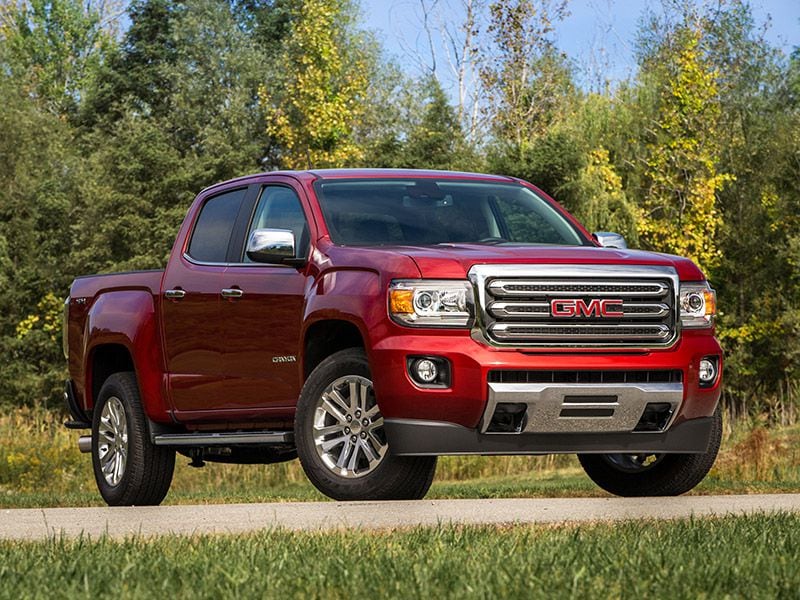
Photo by General Motors
Engine and Driveline Options
The basic Canyon engine is a 2.5-liter four-cylinder, rated at 200 horsepower and 191 pound-feet of torque. However, this engine is not available on the Denali trim. Many Canyon buyers prefer the 3.6-liter V6 engine, and this comes standard on the Denali. This engine produces 308 horsepower and 275 pound-feet of torque. An eight-speed automatic transmission is standard. Buyers who select the V6 engine can tow up to 7,600 pounds with the crew cab and short bed configuration. Payloads go up to 1,605 pounds in this configuration.
Buyers can also select the optional 2.8-liter Duramax turbodiesel engine. This four-cylinder engine produces 181 horsepower and 369 pound-feet of torque, and it’s mated up with the eight-speed automatic transmission. Towing capacity ranges from 7,550 to 7,700 pounds with this engine. Choosing the diesel engine adds $3,235 to the price of the Canyon Denali.
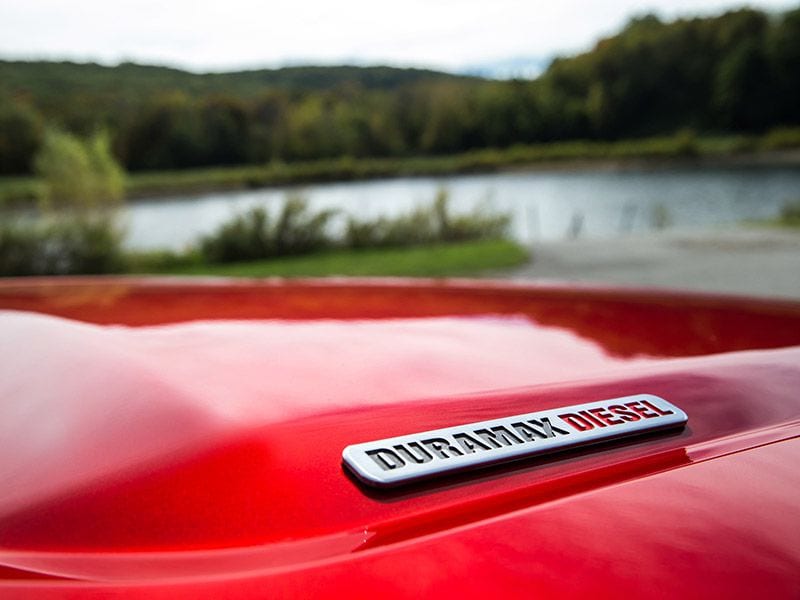
Photo by General Motors
4WD System
GMC’s four-wheel drive system is available only with the V6 or diesel engine options and the eight-speed transmission. What you get is a traditional high-low range 4WD system, but there’s an additional Automatic mode. This allows the Canyon Denali to operate more like a full-time AWD system you’d find in an SUV.
When you set the 4WD system to Automatic, the Canyon monitors itself for wheel slip, and engages the front axle as needed for traction. You can put the system in Automatic mode at any time and just leave it there. When you don’t need it, you’ll get normal rear-wheel power. If you want to go into 4WD, you can shift the Canyon into high range on the fly simply by turning the dial. To get into low range, you still need to stop and place the transmission into neutral before shifting.
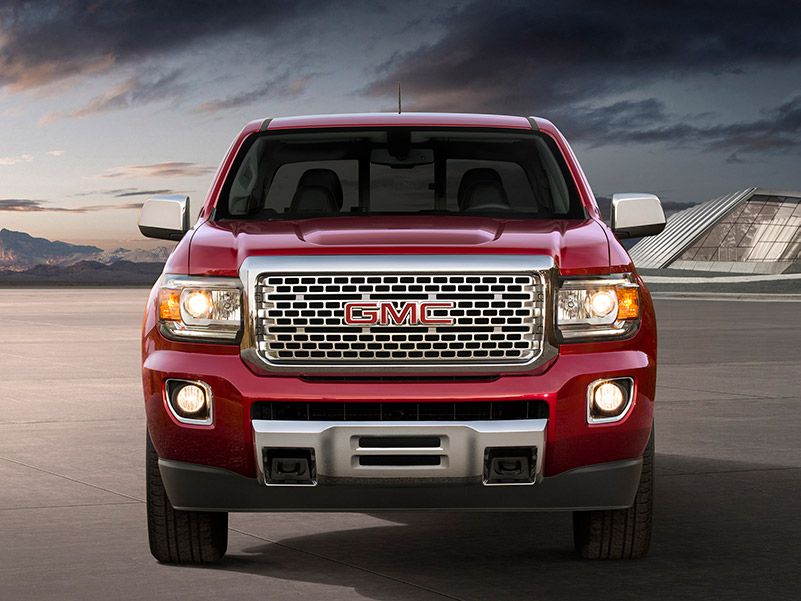
Photo by General Motors
Exterior Design
The Canyon Denali follows GMC’s usual styling cues, which is to say it’s a squared-up, masculine, and professional design. In contrast to the closely related Colorado, the Canyon has GMC’s bold, heavy grille, and more pronounced box flares around the wheels. The Canyon is a good-looking truck, and it fits GMC’s “Professional Grade” image.
The Canyon offers two bed lengths: one just over 5 feet and one about 6 feet. If payload size is as important to you as payload weight, you can get the longer bed and still get a crew cab. That’s something that Ford, Honda, and Jeep don’t offer. On the other hand, Chevrolet, Nissan, and Toyota also offer a full crew cab with a 6-foot bed. One last thing: GMC has not yet adapted its six-way Multi-Pro tailgate to the Canyon Denali. Let’s hope it does that soon, because it’s a great feature.
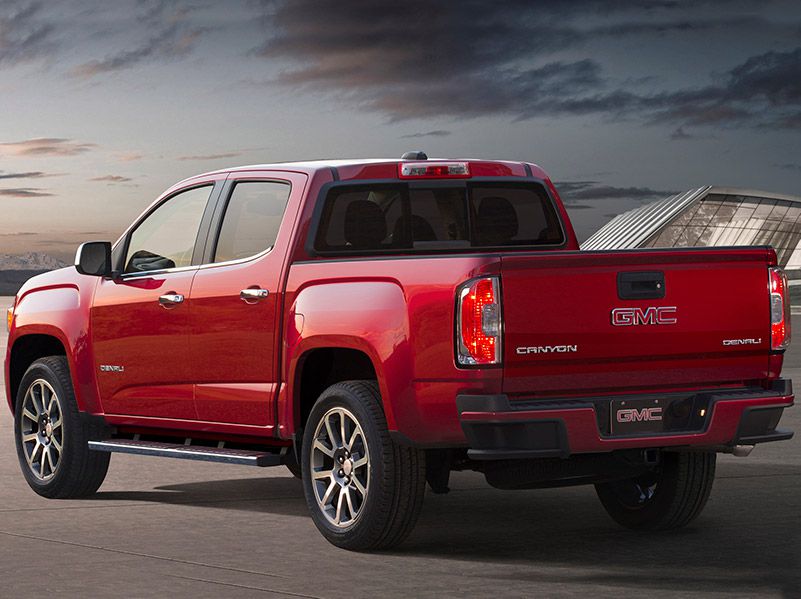
Photo by General Motors
Interior Design
The Canyon Denali offers a first-class interior. You’ll get durable leather, heated and ventilated seats, a heated leather steering wheel, and power adjustments on everything. Touch surfaces are all soft, and there’s a level of craftsmanship with a Denali that you don’t often find in a small truck.
One interior feature that stuck out was the key. Specifically, the Canyon still uses a metal key rather than push-button starting even in the Denali trim. That’s not a problem, just not what you’d expect in a truck with a price tag of $49,025.
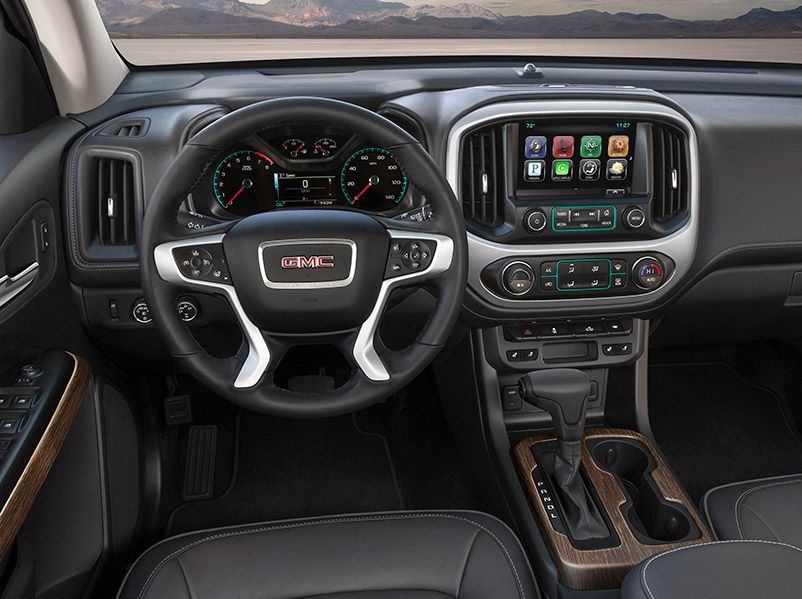
Photo by General Motors
Dashboard Tech
The Canyon Denali comes with an 8-inch touchscreen. All GMC infotainment systems include support for Android Auto and Apple CarPlay, so everyone has access to navigation through their phone. Onboard GPS navigation support comes standard in the Denali, and it’s optional on most other Canyon trims.
One more thing to note is that all Canyons come with some form of rearview camera. Higher trims including the Denali come with a high-definition rearview camera with a useful trailer hook-up function that puts a dashed line right over the tow hitch, which really helps when backing up to your trailer.
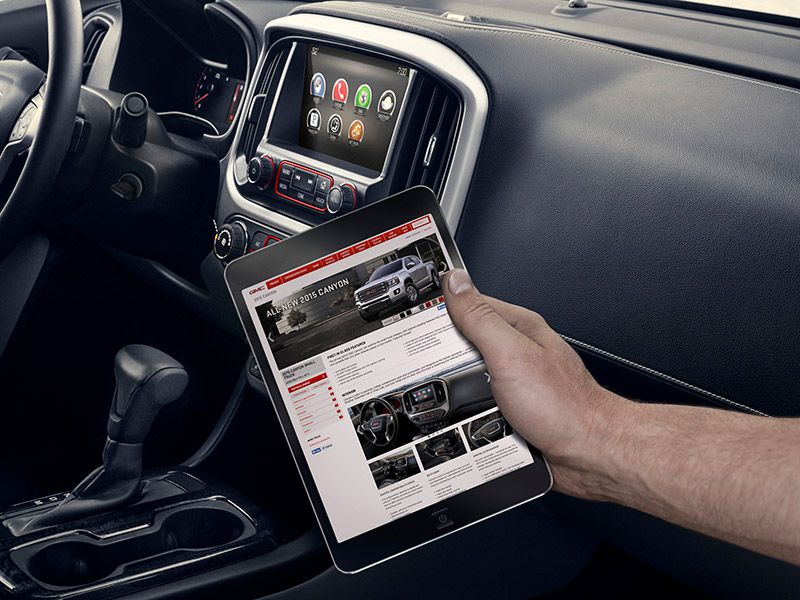
Photo by General Motors
Canyon on the Road
Mid-size trucks have come a long way when it comes to ride and handling. The Canyon offers a firm, smooth ride that handles bumps without bouncing. Advanced features like traction and stability control make the Canyon ride like a much bigger truck, but it’s far more nimble than a full-size. About two days into our test, we switched the Canyon from rear-wheel drive to automatic all-wheel drive, and that further sharpened up the cornering. The Denali we tested had the rear locking differential, and while we couldn’t swear it ever locked up, the Canyon handled winter weather like a champ.
The 3.6-liter V6 engine in the Denali is powerful and well matched to the eight-speed automatic transmission. The combination we tested is capable of towing up to 7,550 pounds, which will take care of almost all travel trailers, and quite a few good size boats or toy haulers. Fuel economy is also good at 17 mpg in the city and 24 mpg on the highway.
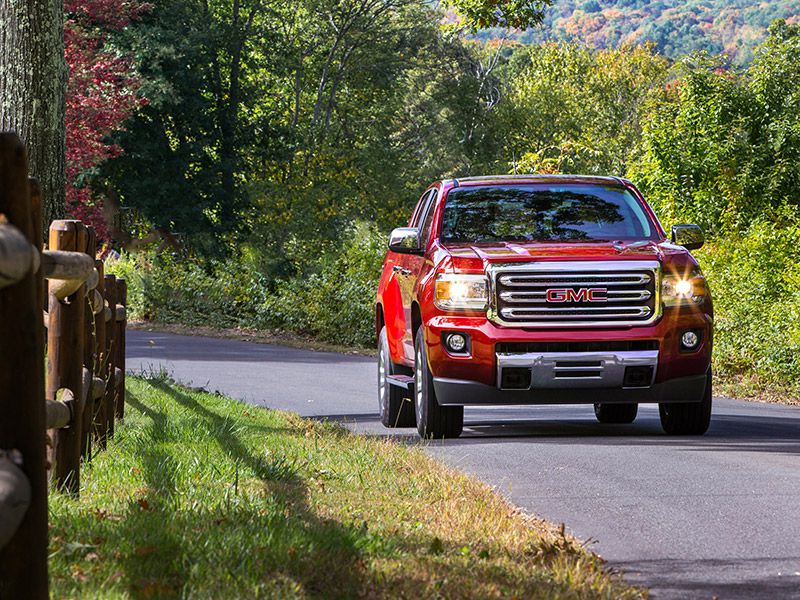
Photo by General Motors
Living With the Canyon
It's easy to get used to a crew cab truck. You have plenty of space in the back seat for groceries, backpacks, and the stuff of life. You can even put larger objects back there if it’s raining, or you need to keep things locked up.
The Canyon Denali comes with advanced driver assistance features that make a big difference in the safety of modern trucks. Forward collision warnings, lane-departure warnings, and radar-based rear park assistance are all included with the Denali trim. And like all GM vehicles, the Canyon provides access to OnStar if there’s trouble. Overall, at the end of a week driving the Canyon Denali every day, we liked it even better than we did at the start. This is a truck you can live with and never feel like its size is a burden. As nice as a full-size truck can be, they can be nerve-wracking in tight streets or parking lots.
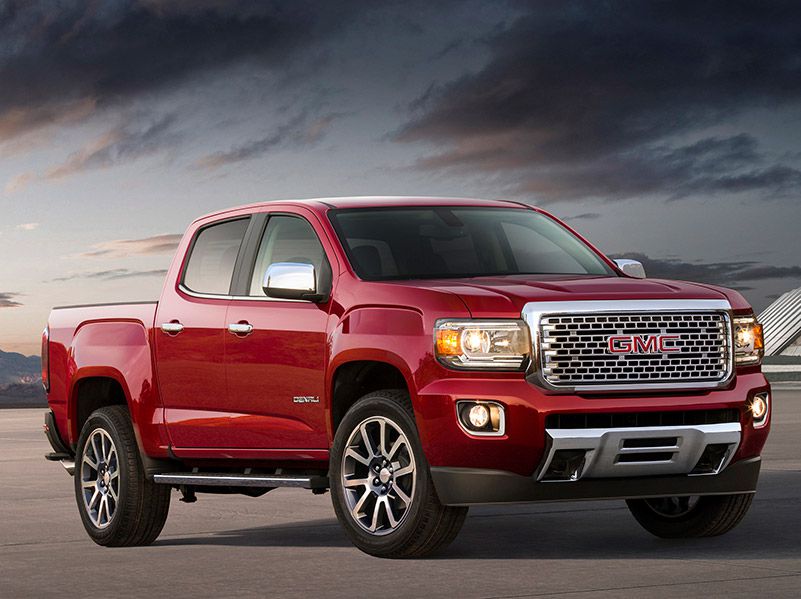
Photo by General Motors
Competitors to Consider
As we mentioned, there are only seven mid-size trucks on the market. The 2019 Chevrolet Colorado is substantially similar to the Canyon in its drivelines and configuration, with some different trim levels like the ZR2 and Bison for more intensive off-road use. The 2020 Jeep Gladiator is new to the market and definitely oriented towards off-road use.
The 2019 Ford Ranger is a serious contender and has the advantage of being brand-new this year. Both the 2019 Nissan Frontier and the 2019 Toyota Tacoma are due for updates, and Toyota has already shown a preview of next year’s model. The odd truck out is the 2019 Honda Ridgeline, which is really more of a crossover SUV with a truck bed. Still, this can be an attractive alternative if your towing needs are under 5,000 pounds.
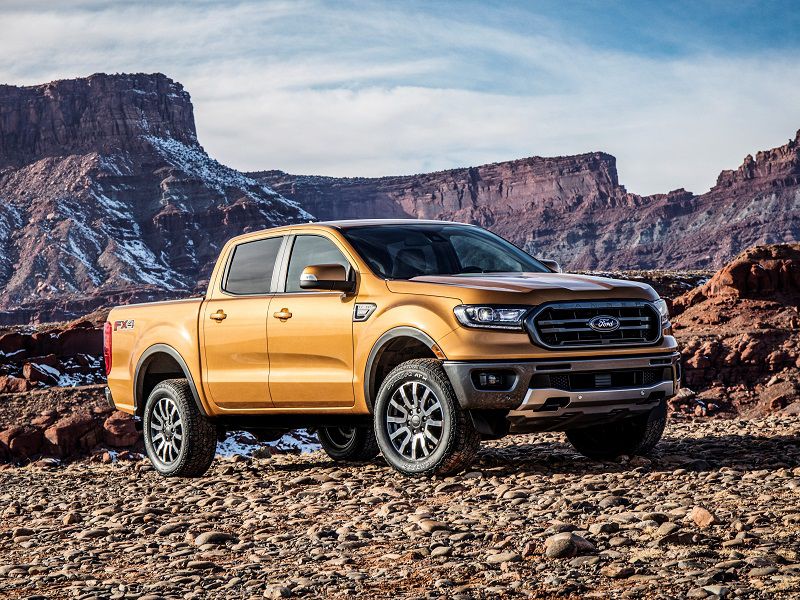
Photo by Ford
The Bottom Line
If you want a luxury mid-size pickup, the 2019 GMC Canyon Denali is at the top of the list. If you’re just looking for a nice truck with a powerful V6 and an adaptable 4WD system, the Canyon offers several less expensive trims that fit the bill. If you want an affordable pickup, the Canyon SL is priced to compete with any of the available options. Whatever your needs may be, there’s a Canyon designed to meet them.
Beyond that, you’re getting GM’s premium truck brand, with a good set of technology and safety features, and an attractive exterior design. True to GMC style, there’s a long list of options, packages, and accessories to individualize your Canyon. If you’re shopping mid-size trucks this year, be sure to take a test drive in the 2019 GMC Canyon Denali. We think you’ll like what you find.
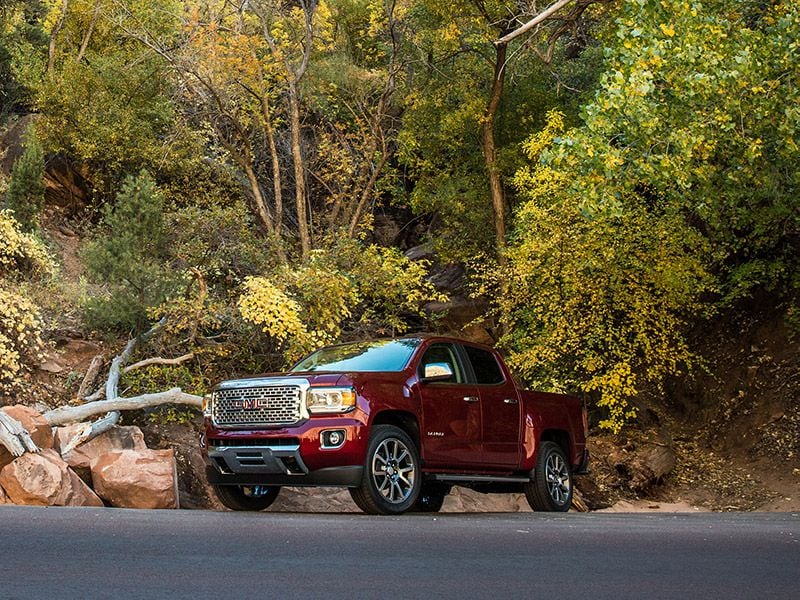
Photo by General Motors